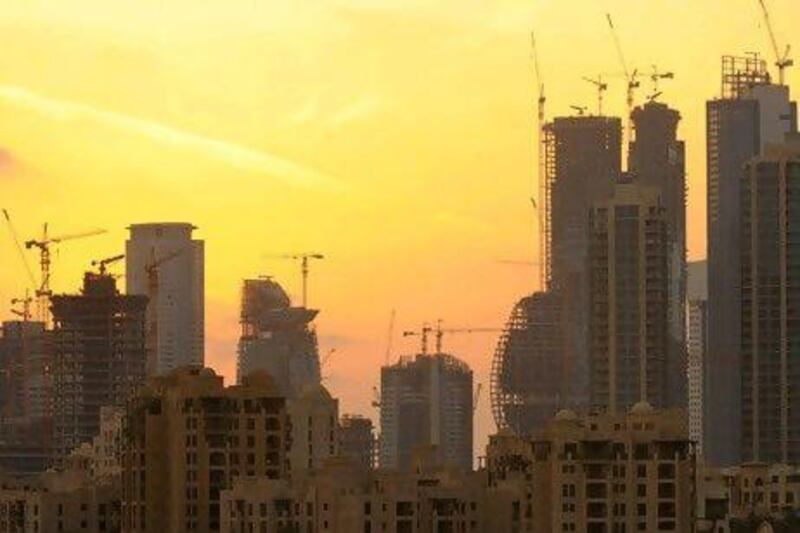Dubai's biggest debt-raising operation to emerge since the Dubai World financial crisis has just been launched ahead of a September deadline to pay back a US$3.75 billion (Dh13.77bn) loan in three months.
But as the deadline nears, the efforts - believed to have been successful - of the Investment Corporation of Dubai (ICD) to raise $2.8bn in new bank finance has stirred questions in the banking world on how the Government's investment arm plans to repay the rest.
The corporation is the third pillar of what is known informally as Dubai Inc and is the holder of the so-called "good assets", but questions have arisen on what options ICD has on managing its debt finances before and beyond the due date.
"Assuming [the corporation] redeploy the $2.8bn for the loan [due in September], ICD still would have to raise almost $1bn to cover the funding gap," says Martin Kohlhase, the assistant vice president for Moody's Middle East.
The bank finance is a "significant benefit" for the corporation, Mr Kohlhase says, but there is a question mark over where the company will get refinancing for the remaining debt due.
Although the corporation faces a challenge on repayments, industry experts believe the investment fund is under no immediate pressure. It could use some of the $2.8bn being raised to pay down the loan, but there are other options on the table including the sale of non-core assets, a bond issue or even restructuring the repayment over a longer period, bankers and corporate lawyers say.
Gary Watts, the head of capital markets at Al Tamimi law firm in Dubai says the bank finance raised sends a "clear signal that ICD regards the climate for asset sales in the short term to be adverse". Though he does not expect major asset sales any time soon, he says it is inevitable, providing market conditions are conducive.
"Most observers expect ICD and the Dubai Government to pursue a medium to long-term strategy of reducing gearing and that can only be achieved through asset sales and sell-downs, not refinancings," Mr Watts says.
ICD is regarded as the most solid of the emirate's government-related holding companies. The corporation is backed by some of the country's most prized cash-generating assets including Emirates Airline, Dubai Aluminium and the Dubai World Trade Centre.
Dubai Holding and Dubai World are the other two pillars of Dubai Inc. Both of these entities have engaged creditors in talks to restructure their debt and the companies that lie within them.
But with an investment portfolio also weighted to the property and financial sector, ICD has not been immune to the tremors of the financial crisis.
It still has a significant amount of debt on its books, including a $6bn loan, some of which is maturing in September.
ICD originally launched the $6bn loan in August 2008 - it was split between a $3.75bn conventional financing and a $2.25bn Islamic financing.
The fund's existing lenders on the conventional financing are Barclays, Citigroup, HSBC, JP Morgan and Royal Bank of Scotland. The Islamic tranche is led by Dubai Bank, Dubai Islamic Bank, Noor Islamic Bank and Standard Chartered.
Credit Agricole, or Caylon, as it was known at the time, Deutsche Bank, Emirates Bank, Mashreq, Morgan Stanley and UBS also joined the deal ahead of the launch. Each bank committed $500 million, which was later reduced to about $333m.
Ahmad Alanani, a director at Exotix, a frontier markets investment bank that specialises in structured finance says he had expected ICD to pay a portion of the outstanding loan this year, and agree to a deal to extend the terms of the balance. But the new bank financing signalled that the banks will be co-operative about repayments, he adds.
"ICD is not under any pressure, banks are co-operating with them and they're comfortable with that," Mr Alanani says, adding that the potential for rolling over the remaining due balance is also a possibility.
The bond market has also been flagged as a realistic method of raising money for the fund.
"ICD is not going to wait until the maturity of the debt and they are likely to opportunistically tap into the market today to secure such a refinancing," Mr Kohlhase says, adding that having a mixture of debt instruments including bonds and loans actually strengthens a fund's debt strategy.
But the opportunity for tapping into the bond market is slim, Mr Kohlhase warns. "The only window now is between now and the summer break, or again after Ramadan," he says.
Dubai entered 2008 with little debt but by the end of last year it had accumulated $30bn of sovereign debt, or 36 per cent of GDP. By international standards, the emirate's debt is not high, but the ability of all three pillars to continue meeting their debt obligations depends partly on tapping remaining capital in the Dubai Financial Support Fund (DFSF).
It is unclear whether this fund will need to be topped up as this depends on the ability of the Big Three to further restructure bank debt, refinance upcoming bond maturities with new bond issues or secured bank debt and continued willingness and ability to sell assets.
In September, the Dubai Government said there was $7.2bn remaining to be drawn from the DFSF from loans provided by the Central Bank and Abu Dhabi and its banks in 2009.
"We think Dubai will be able to manage its sovereign debt burden," wrote analysts at Exotix in a note to investors, "so long as there are no more nasty … surprises that necessitate big bailouts".
The note added that despite being perceived as a "last resort", "we believe the Dubai Government and[related entities] would even be willing to sell partial stakes in … prized assets", such as Emirates Airline, Jumeirah Group and Dubai Maritime City.
[ fhalime@thenational.ae ]





